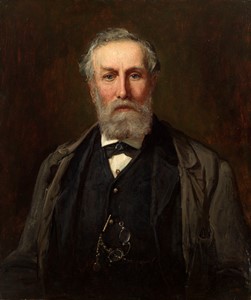As geologist and science writer Nina Morgan discovers, sweet dreams can turn sour
 The island of Arran off the west coast of Scotland is certainly high on the list of localities for generating an interest in geology. Arran is also the locality where the family of Sir Andrew Crombie Ramsay [1814 – 1891, picture], the third Director of the Geological Survey, often spent their holidays, and where Ramsay cut his geological teeth. It is also the place where Ramsay's geological career almost ended before it began.
The island of Arran off the west coast of Scotland is certainly high on the list of localities for generating an interest in geology. Arran is also the locality where the family of Sir Andrew Crombie Ramsay [1814 – 1891, picture], the third Director of the Geological Survey, often spent their holidays, and where Ramsay cut his geological teeth. It is also the place where Ramsay's geological career almost ended before it began.
Son of a manufacturing chemist and businessman associated with the dyeing industry who died in 1827, Ramsay began his working life at the age of 13 to help support his mother and three siblings. He spent 10 uninspiring years working in various unsuccessful business enterprises. Meanwhile, Ramsay's interest in geology was sparked off by John Nichol [1804 - 1859] Professor of Practical Astronomy at Glasgow University, and greatly reinforced in 1836 by a chance meeting on Arran with Charles Lyell [1797 – 1895].
Unfortunate overworking
Ramsay's geological career looked ripe to set sail in 1839, when Nichol, one of the local convenors of the 1840 British Association meeting in Glasgow, recruited Ramsay to prepare a model of the island of Arran, together with specimens of its geological formations; and to read his first scientific paper: 'Notes taken during the Surveys for the Construction of the Geological Model, Maps and Sections of the Island of Arran'. Ramsay was also invited to meet a party of the geological great and good due to travel over to Arran by steamboat and train and 'give them a general exposition of Arran geology'.
But, alas, reports Archibald Geikie [1835 – 1924] in his 1895 book, Memoirs of Andrew Ramsay, Ramsay, who 'had worked hard in making all the preliminary preparations, and for some days before had been up early and late, unluckily overslept himself, and was too late for both steamboat and train.' The geological great and good travelled on without him.
Networking
But although Ramsay missed the boat on that occasion, his geological career flourished nonetheless. Ramsay's efforts on Arran formed the basis of his first book, The Geology of the Island of Arran from Original Survey, published in 1841. And the contacts he made at British Association meeting served to launch his career. After the meeting Roderick Murchison [1792 – 1871] invited Ramsay to accompany him on field work in Russia. When that trip fell through, Murchison then encouraged Henry De la Beche [1796 – 1855], first Director of the Geological Survey of Great Britain, to offer Ramsay an appointment as an Assistant Geologist. Ramsay started work with the Survey in Pembrokeshire in April 1841 at a salary of 9 s per day, and rose through the ranks to become, shortly after the death of Murchison, the Survey's second Director, the third Director of the Geological Survey of Great Britain. Along the way he became an acknowledged expert in geomorphology, glacial phenomena and the geology of North Wales. He was honoured with many awards, medals, professorships. and received a knighthood shortly before his retirement in 1881.
But in spite of his ultimately successful career, according to Geikie, oversleeping and missing the boat to Arran remained for Ramsay 'an untoward accident he never ceased to regret.' With that in mind, Ramsay's top tip to all the aspiring geologists under his command must surely have been: don't forget to set the alarm clock!
- Nina Morgan is a geologist and science writer based near Oxford. Her latest book, The Geology of Oxford Gravestones, is available via www.gravestonegeology.uk
Acknowledgements
Sources for this vignette include: The entry for Andrew Ramsay by David Oldroyd in the Oxford Dictionary of National biography; Memoir of Sir Andrew Crombie Ramsay by Archibald Geikie , published by Macmillian and Co. 1895; and Eminent living geologists, Sir Andrew C. Ramsay, Geological Magazine, vol 9 (1882), pp. 289 – 93 (available for download at: https://archive.org/details/geologicalmagaz01woodgoog )